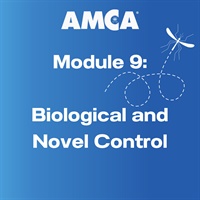Biological and Novel Control - Module 9
- Average Rating:
- Not yet rated
- Categories:
- Integrated Mosquito Management
- Faculty:
- Constance Darrisaw | Elizabeth Hart
- Course Levels:
- All Levels
- Duration:
- 21 minutes
- Format:
- Audio and Video
- License:
- Never Expires.
Description
Welcome to Module 9 Biological and Novel Control of the AMCA Best Practices for Integrated Mosquito Management Virtual Training Program. This training program will provide you with the knowledge needed to understand and conduct Integrated Mosquito Management (IMM); including topics such as mosquito biology and the five main components of IMM: community engagement, collecting and using data, reducing potential larval habitat, using all control methods available and reasonable, and regularly evaluating the efficacy of the program.
Note, that this module is part of a larger program, and if you are interested in completing the AMCA Best Practices for Integrated Mosquito Management Virtual Training Program Certificate, you MUST do this module within the overall program. Please subscribe to the program prior to beginning this module, please click here to begin.
Specifically, this module will cover:
- What is biological control
- Limitations of biological control
- Some organisms used in biological control programs
- Using mosquitoes to control mosquitoes
- Novel technologies emerging for use in mosquito control
Recommended reading for this module:
- Pages 65-66 in "Best Practices for Integrated Mosquito Management" found at https://www.mosquito.org/assets/pdf/hr_november_2021_amca_bmp_ma/
Additional Resources
- Benelli, G., Jeffries, C.L. and Walker, T. 2016. Biological control of mosquito vectors: past, present, and future. Insects, 7(4), p.52.
Handouts
Additional Resources
|
|||
Faculty
Constance Darrisaw Related Seminars and Products
Constance Darrisaw is a graduate of the University of Florida with a bachelor’s degree in Entomology and Nematology. Currently she is a Field Validation Biologist with the Lee County Mosquito Control District in Lehigh Acres, Florida. There she focuses on maintaining mosquito colonies and completing insecticide resistance testing, along with product efficacy and new product testing.
Elizabeth Hart Related Seminars and Products
Elizabeth Hart is the lab manager at the Mosquito Abatement District- Davis in Kaysville, UT. She received her bachelor’s degree in botany from Brigham Young University. Later she completed a second bachelor’s degree in horticulture from Utah State University. While working on her second degree, she worked as a seasonal employee for Utah County Mosquito Abatement, which helped create her desire to work in mosquito control full-time.
